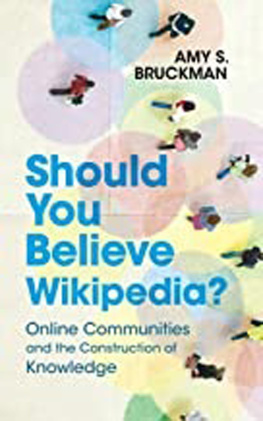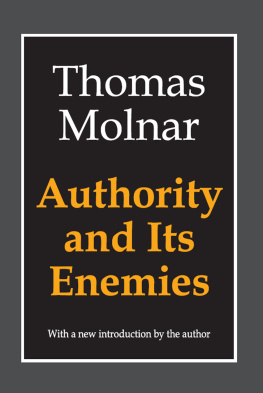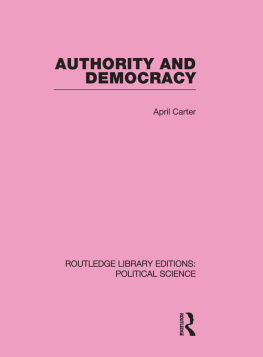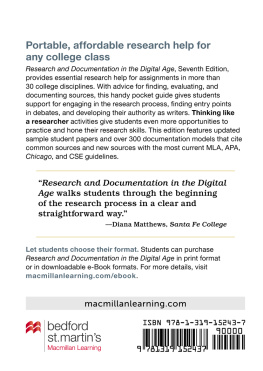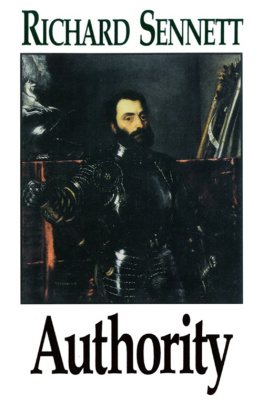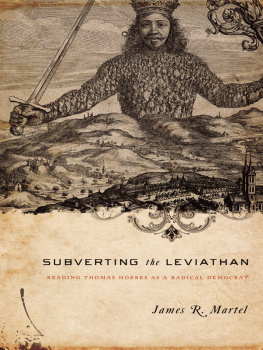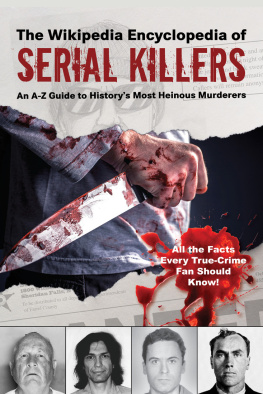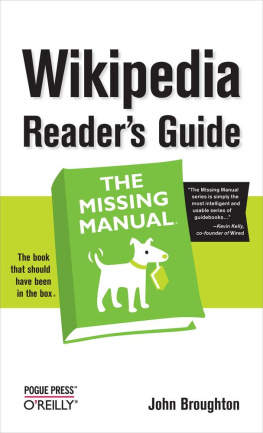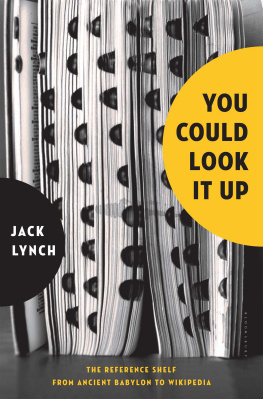Wikipedia U
Tech.edu: a hopkins series on education and technology
Wikipedia U
Knowledge, Authority, and Liberal Education
in the Digital Age
THOMAS LEITCH

2014 Johns Hopkins University Press
All rights reserved. Published 2014
Printed in the United States of America on acid-free paper
9 8 7 6 5 4 3 2 1
Johns Hopkins University Press
2715 North Charles Street
Baltimore, Maryland 21218-4363
www.press.jhu.edu
Library of Congress Cataloging-in-Publication Data
Leitch, Thomas M.
Wikipedia U : knowledge, authority, and liberal education in the digital age / Thomas Leitch.
pages cm. (Tech.edu: A Hopkins Series on Education and Technology)
Includes bibliographical references and index.
ISBN 978-1-4214-1535-2 (hardcover : alk. paper) ISBN 978-1-4214-1550-5 (electronic) ISBN 1-4214-1535-6 (hardcover : alk. paper) ISBN 1-4214-1550-X (electronic) 1. Education, Humanistic. 2. ResearchMethodologyData processing. 3. Wikipedia. I. Title.
LC1011.L44 2014
370.11'2dc23 2014004984
A catalog record for this book is available from the British Library.
Special discounts are available for bulk purchases of this book. For more information, please contact Special Sales at 410-516-6936 or .
Johns Hopkins University Press uses environmentally friendly book materials, including recycled text paper that is composed of at least 30 percent post-consumer waste, whenever possible.
To Gardner Campbell
CONTENTS
ACKNOWLEDGMENTS
Michael Lonegro suggested the subject of this book. Laura Wimberley and Gardner Campbell provided invaluable ideas during the early months of its gestation. Fellows in two seminars I led in the Delaware Teachers Institute, Media Literacy in 2011 and The Problems and Perils of Online Research in 2012, explored some of its leading problems with me. Matt McAdam, Michele T. Callaghan, an extraordinarily helpful anonymous reviewer, and the enterprising and resourceful staff at Johns Hopkins University Press helped put it in its present form. Finally, I am forever indebted to numberless anonymous contributors, editors, and administrators of Wikipedia for providing me such a fertile and provocative field for research and so many inspiring examples of civilized disputation. It goes without saying, as it does in every Wikipedia page I have seen, that none of these generous and often unwitting collaborators is responsible for any errors of fact, omission, emphasis, or implication, which I hereby acknowledge as my own.
Wikipedia U
INTRODUCTION
The Battle of the Books
DESPITE THE PROMINENCE of the word Wikipedia in this books title, its true subject, indicated by its subtitle, is authority. Even if the title is not perfect in its emphasis, it is accurate enough, for the contemporary arena for debates about authority on which I focus is the intricate dance between the keepers of liberal education and the users and purveyors of online knowledge, embodied in the online encyclopedia Wikipedia. Throughout this book I will be generalizing frequently, and at times perhaps licentiously, about the role of liberal education in society, the ways online sources of knowledge are judged, and the question of who deserves to be called an authority. So it seems only fair to say as precisely as I can at the outset what I mean by each of these three concepts.
Dueling Experts: Wikipedia versus the Academy
I use liberal education to refer to the educational ideals and practices long associated with undergraduate colleges in the United States, which I will call the academy. Undergraduate education has traditionally been devoted to the pursuit of what the noted theologian and education pioneer John Henry Newman called liberal knowledge: knowledge which stands on its own pretensions, which is independent of sequel, expects no complement, refuses to be informed (as it is called) by any end, or absorbed into any art, in order duly to present itself to our contemplation.
Liberal education has for many years been the special province of liberal arts curricula. It is more closely associated with the social sciences than the hard sciences, more closely associated with the humanities than the social sciences, and most closely associated with areas like English and history and foreign languages that are not gateways to a single career in the way that chemistry or psychology can be. Liberal education has traditionally been associated not only with humanistic values, values stemming from universalistic assumptions about human nature, but, as the educational philosopher Harry S. Broudy points out, also with values as such: If the sciences, physical and social, are the sources of warranted assertion as to matters of physical fact, the humanities claim to be the sources of warranted belief about value fact.
Until recently the principal goal of liberal educationwhich Andrew Delbanco maintains springs from the ideals of religion and democracy
In our time, an increasing proportion of the knowledge that was long found in university libraries and other print archives is instead sought through online researchresearch that is conducted by means of computer-based digital resources, search engines, databases, archives, and other online tools. Most of the people who conduct this research do not happen to be academics. Travelers read reviews of hotels and restaurants before making their reservations. Do-it-yourselfers watch videos showing them how to install new showerheads and repair electrical appliances. Fans consult online sources for the latest theories about plotlines in Game of Thrones. I do not mean to marginalize these activities, which are far more ubiquitous than academic online research. I spend a good deal of time focusing on the relationship between liberal education and online research not because it is statistically the most frequent use of online resources but because it reveals most clearly the paradoxes of authority I wish to examine.
These paradoxes begin with the academys love/hate relationship with the World Wide Web. The basis for the academys love for the riches the digital age makes possible is everywhere. Online archiving has made digitized versions of priceless texts from the Dead Sea Scrolls to the Gutenberg Bible widely available to researchers and students. Computer databases and search engines make it possible to identify and locate scholarly resources with greater success, and in far less time, than earlier generations could have dreamed possible. The ability of university libraries to subscribe to online journals instead of procuring hard copies has freed sorely needed shelf space. The academys constant hunger for new scholarly resources, protocols, and strategiesdriven by the needs of both college teachers and the apprentices in their classroomshas found its perfect complement in the Web. Even that lowliest of all computer technologies, word-processing software, has made it possible for scholars and students to write more quickly and accurately, revise more painlessly, and produce professional-looking copy more easily than ever before. For both students seeking material to use in fulfilling assignments and teachers engaged in original research, digital tools and resources have ushered in a golden age for the information that, as contemporary wisdom has it, wants to be free.
At the same time, the explosion of online research has provoked many conflicts. Scholars raised to trust books and journals often have serious reservations about online sources, even though, as Alvin Kernan reports, More than half of my students were already telling me in the mid-1980s that what they saw on a computer screen held more truth for them than did a printed page. This battle has been exacerbated by the appearance of online search engines in smartphones, whose size, portability, and association with a perceived deterioration of social and cultural norms make them anathema to many a seasoned researcher.
Next page

